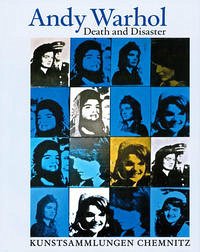The Kunstsammlungen Chemnitz are showing 61 of the most important works by Andy Warhol from the group “Death and Disaster”. It is the first European museum exhibition devoted exclusively to this theme and will run from 23 November 2014 to 22 February 2015. Andy Warhol (1928–1987) is certainly one of the most famous artists of the 20th century. Despite all the initial opposition, his works are very highly regarded and in great demand. This exhibition of his most important and rigorous group of works “Death and Disaster” shows that the artist, who was repeatedly misunderstood as superficial, succeeded in creating depiction of death which are in no way inferior to the expressive western dances of death. They are paintings of the tragedy and absurdity of life. In depictions of car accidents and race riots in the southern states of America, of the execution machine “Electric Chair” and of suicide, Andy Warhol shows that the beautiful surface of the consumer world conceals a cruel, dark side, which he exposes directly and without comment. Andy Warhol began to engage with catastrophes, death and accidents in 1962/63. His works on the theme of “Death and Disaster” were initially rejected, however, above all in the United States. It was 1964 before the artist was able to persuaded Ileana Sonnabend (1914–2007) to show his new works in her Parisian gallery. The paintings were given a more positive reception in Europe and were praised by exhibition visitors and critics alike. This may well have to do with the fact that Europe had a centuries old tradition of pictorial and literary forms of death. As of the 15 century, partly monumental murals were painted, above all on cemetery walls and in cloisters and churches, depicting the dance of death as a “memento mori”. These show visions of death that have extended over two catastrophic world wars and the horrific crimes of the National Socialists to this very today. Andy Warhol’s “Death and Disaster” series can therefore also be seen as one of the most expressive forms of the dance of death in the 20th century. Almost all Warhol’s paintings of death and accidents address the theme of man-made tragedies and they are still of highly topical today. Scarcely any other artist apart from Andy Warhol was capable of or willing to make such radical statements on the pretext of producing a seductive surface aesthetic and with the help of a total retraction of personal expression. The theme of the exhibition was suggested by its curator Heiner Bastian, who has been familiar with Warhol’s oeuvre for many years. He was a friend of Warhol’s and organised influential retrospectives of the artist’s work for the Neue Nationalgalerie, Berlin, the Tate Modern, London, and the Museum of Contemporary Art, Los Angeles.
Bitte wählen Sie Ihr Anliegen aus.
Rechnungen
Retourenschein anfordern
Bestellstatus
Storno

